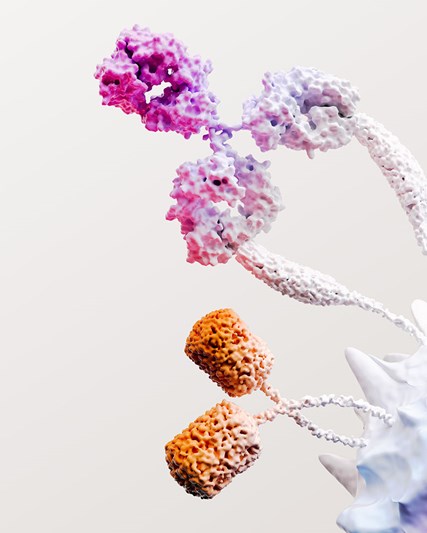Positive data for bepirovirsen from B-Clear phase IIb trial presented at American Association for the Study of Liver Diseases’ Meeting with simultaneous publication in the New England Journal of Medicine
Issued: London, UK
For media and investors only
- Phase III trial evaluating bepirovirsen to start in H1 2023
- Phase II trials ongoing to explore potential sequential treatment options with the aim of increasing functional cure rate
GSK plc (LSE/NYSE: GSK) today announced the publication of positive end of study results from the B-Clear phase IIb trial evaluating the safety and efficacy of bepirovirsen for the treatment of chronic hepatitis B (CHB) in the New England Journal of Medicine. The results showed that treatment with bepirovirsen, an investigational antisense oligonucleotide treatment, resulted in sustained clearance of hepatitis B surface antigen (HBsAg) and hepatitis B virus (HBV) DNA both in patients on concurrent nucleoside/nucleotide analogues (NA) and patients not-on-NA therapy.
The results offer an early indication that bepirovirsen might be a potential treatment, either as monotherapy or in combination with NAs, that could result in functional cure. In addition, the trial identified a potential patient sub-group more likely to benefit from treatment with bepirovirsen, helping to guide future development.
Chronic hepatitis B is a major global health threat that can progress to liver complications including cirrhosis and liver cancer, with approximately 900,000 people dying each year.1,2 Functional cure means that the virus is at levels that are low enough to be undetectable in blood and can be controlled by the immune system without medication. Current treatment options have limited success in achieving functional cure. The mainstay of therapy includes nucleoside/nucleotide analogues (NA) which are often taken for life because they suppress but rarely clear the virus.
Chris Corsico, SVP, Development, GSK, said: “Today’s results from the B-Clear study are a promising step forward for the approximately 300 million people living with chronic hepatitis B. We look forward to confirming these findings for bepirovirsen in our phase III study starting next year, as well as exploring potential sequential therapy options with the aim of helping more people living with CHB achieve functional cure.”
The B-Clear phase IIb trial investigated the efficacy and safety of 12 or 24 weeks of treatment with bepirovirsen in people with CHB on stable NA treatment or not-on-NA treatment at study start. Bepirovirsen, with a loading dose at day 4 and 11, and at a dose of 300mg per week for 24 weeks (treatment arm 1) resulted in 9% of patients on-NA and 10% of patients not-on-NA achieving the primary outcome of HBsAg levels below the Lower Limit of Detection (LLOD) and HBV DNA levels below the Lower Limit of Quantification (LLOQ). Patients with low baseline hepatitis B surface antigen levels3 responded best to treatment with bepirovirsen in treatment arm 1 with 16% of patients on-NA and 25% of patients not-on-NA achieving the primary outcome.
The end of study results will be presented today at the American Association for the Study of Liver Diseases’ Liver Meeting 2022 (AASLD) in Washington DC, and simultaneously published in the New England Journal of Medicine.
Professor Man-Fung Yuen, Principal Investigator and Chief of Division of Gastroenterology and Hepatology, Queen Mary Hospital, The University of Hong Kong, said: “Chronic hepatitis B affects millions of people worldwide and is notoriously difficult to treat. The promising data from the B-Clear study offer the potential for a chance of functional cure for the millions for people who are chronically infected with the virus, particularly for those with low baseline HBsAg levels.”
GSK is exploring sequential treatment trials of bepirovirsen with other therapeutic modalities, with the aim of increasing functional cure rate in more patients and reducing the overall burden of CHB. These include:
- Phase IIb trial of bepirovirsen in sequential combination with pegylated interferon (PegIFN) treatment;
- Phase II trial of bepirovirsen in sequential combination with GSK’s chronic hepatitis B targeted immunotherapy.
About the B-Clear phase IIb trial
The B-Clear trial consisted of two parallel cohorts, one for patients receiving NA treatment and the other for patients who were not-on-NA. Patients were randomised into 1 of 4 treatment arms within each cohort, with treatment administered weekly with or without loading doses (LD) on days 4 and 11:
- Arm 1: Bepirovirsen 300 mg with LD for 24 weeks;
- Arm 2: Bepirovirsen 300 mg with LD for 12 weeks then 150 mg for 12 weeks;
- Arm 3: Bepirovirsen 300 mg with LD for 12 weeks then placebo for 12 weeks;
- Arm 4: Placebo with LD for 12 weeks then bepirovirsen 300 mg without LD for 12 weeks.
There were no safety signals to preclude further development. AEs leading to treatment discontinuation occurred in 17 participants overall, with 0–4% frequency in participants on-NA, and 0–7% frequency in participants not-on-NA. Serious AEs (SAEs) were reported in 6 (3%) participants on-NA and 11 (5%) participants not-on-NA; 1 SAE in the on-NA and 3 in the not-on-NA population were considered related to treatment.
Longer term durability of response will be investigated in the B-Sure trial which will follow participants for an additional 33 months and includes criteria for stopping NA therapy with the possibility to demonstrate functional cure in patients who successfully stop all medication and continue to demonstrate no serologic evidence of HBsAg or HBV DNA.
About CHB
Hepatitis B is a viral infection of the liver, caused by the hepatitis B virus, that can cause both acute and chronic liver disease.1 CHB is a long-lasting infection and occurs when the body’s immune system is unable to fight off the virus and it persists in the blood and liver.2 It is estimated that there are 296 million people globally with CHB.1 As of 2019, 30.4 million people were aware of their infection, while 6.6 million of the people diagnosed were on treatment.1 Even when treated, CHB can progress to liver complications including cirrhosis and liver cancer, which results in nearly 900,000 deaths per year.2
Viral suppression is the current goal for treatment of CHB. However, viral replicative activity may return upon cessation of treatment, requiring lifelong therapy to prevent viral rebound. The concept of functional cure of CHB aims to eliminate the virus from circulating in the blood and prevent any disease activity in the liver. As only a limited number of patients currently treated for CHB achieve HBsAg loss, considered the hallmark for achieving functional cure, development of therapeutic approaches to reach functional cure are needed.2
About bepirovirsen (GSK3228836)
Bepirovirsen is an investigational antisense oligonucleotide (ASO) designed to specifically recognise the RNA that the hepatitis B virus uses to replicate itself in the infected liver cells (hepatocytes) and make the viral antigens (proteins) which facilitate chronicity of the disease by helping to avoid clearance by the immune system. The ASO recruits the liver’s own enzymes to eliminate the RNA by digesting it to an inactive form. The subsequent reduction in the levels of the RNA results in a decrease in both the virus and the production of viral antigen (HBsAg) by the hepatocytes, which can be measured by a drop in the HBV DNA and antigen levels in the circulating blood. Bepirovirsen has an additional property of stimulating immune responses via Toll-like receptor 8 (TLR8) which may help the immune system to achieve durable clearance of the virus from circulating blood.
Bepirovirsen (previously known as ‘ISIS 505358 or IONIS-HBVRX’) was discovered by and jointly developed with Ionis Pharmaceuticals. Bepirovirsen is one of the ASO HBV programme assets in-licensed by GSK from Ionis Pharmaceuticals in August 2019.
About GSK at AASLD
In addition to the full study results for the B-Clear trial, GSK will share updates on its specialty and vaccines pipeline at the AASLD meeting in Washington DC, including:
- Four abstracts on linerixibat, an investigational ileal bile acid transporter (IBAT) inhibitor for patients with cholestatic pruritus associated with primary biliary cholangitis (PBC). These include a Decentralized Clinical Trial (DCT) design with the potential to improve patient recruitment and retention in the GLISTEN phase III trial;
- An abstract describing T-cell immunogenicity data on the chronic hepatitis B targeted immunotherapy (CHB-TI) obtained from the sequential arm of a phase I/II trial on the CHB-TI as monotherapy;
- External scientific engagement on the start of the phase IIb study of GSK4532990 in adults with nonalcoholic steatohepatitis (NASH).
About GSK
GSK is a global biopharma company with a purpose to unite science, technology, and talent to get ahead of disease together. Find out more at gsk.com/company
Cautionary statement regarding forward-looking statements
GSK cautions investors that any forward-looking statements or projections made by GSK, including those made in this announcement, are subject to risks and uncertainties that may cause actual results to differ materially from those projected. Such factors include, but are not limited to, those described in the Company's Annual Report on Form 20-F for 2021, GSK’s Q3 Results for 2022 and any impacts of the COVID-19 pandemic.
References
[1] World Health Organisation, Hepatitis B Key Facts, June 2022
[2] World Health Organization. Global Hepatitis Report, 2017
[3] Prospectively defined as including patients with a baseline HBsAg ≤ 1000 IU/mL



